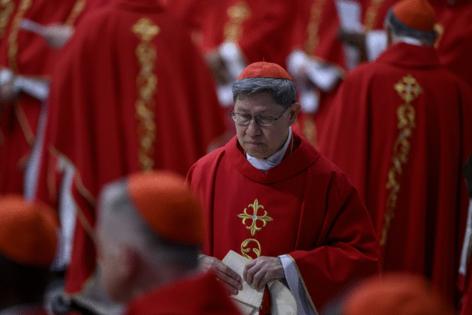Heartbreak and acceptance for Philly's Catholic Filipinos over pope
Published in News & Features
PHILADELPHIA — As Philadelphians and Catholics rejoiced at the announcement of the new pope, with his ties to Villanova University, among local Filipinos, there was some disappointment.
The election of Pope Leo XIV meant Filipino cardinals who had been front-runners in the papal process would not ascend to the Catholic Church’s highest post. Many had been rooting for Cardinal Luis Antonio Tagle, who would have been the first Asian pope in the church’s modern era.
Chance Anies, 33, the chef and owner of Filipino BYOB Tabachoy, whom I was interviewing when news of the new pope broke Thursday, shifted from discussing his new menu items to expressing his own disappointment.
“I am not Catholic. I don’t have a lot of stake in this other than being Filipino,” Anies said. “I had heard that Tagle was a pretty great guy. His perspective on life was similar to Pope Francis, who led a great life in the Catholic Church. I thought Tagle would follow in his footsteps, and him also being Filipino is a really, really cool thing. If he came to Philly, I thought I’d have the chance to feed him.”
Anies said despite being one of the largest Asian populations in the U.S., Filipinos remain one of the least known.
“There’s an export system of Filipino labor globally. Filipinos are recognized around the world as cooks, nurses, and members of the military,” he said. “This feels like a missed opportunity to be recognized around the world as also the country that produced a pope.”
There are an estimated 31,000 to 35,000 Filipinos in the Greater Philadelphia area, spread evenly throughout the city. Filipinos are the third-largest Asian immigrant group in the U.S., following Chinese and Indian immigrants.
Some Filipinos have internal conflicts with the Catholic Church that led them away from practicing Catholicism, whether it had to do with the church’s stance on LGBTQ issues or widespread child sex abuse.
But each of the Filipinos I spoke with for this article, religious and nonreligious, Catholic and not, had been hoping for Tagle to be the next pope.
“I wish Tito Tagle would have won so immensely bad,” said Ranzen Borja Ocampo, 27, in an Instagram DM. Tito is the Tagalog word for uncle. “I am neither Catholic nor did I grow up Catholic, but both my parents did. My hope is that one day a Filipino pope would advocate for the Philippines’ historical struggles with government corruption and national sovereignty.”
The pope’s influence on world matters, they added, and would have brought “a lot of legitimacy to the struggles that Filipinos at home and abroad face.”
PJ Agbay, 33, who had grown up deeply rooted in Catholicism, even spending eight years as an altar boy, said he felt swept up in the excitement over the prospect of a Filipino pope.
“Our culture has always rallied behind any Filipino who makes it into the mainstream, so when that rumor started gaining traction — from meme pages to international news — I really believed it,” said Agbay.
On a video chat from Manila on Friday, Brad Baldia, 53, the former president of the Philadelphia chapter of the Philippine Chamber of Commerce, said, “I was hoping for a Filipino pope, which will happen at some point.” The fact that Pope Leo is American but Spanish-speaking gave Baldia hope that the pope would relate to Hispanic populations with whom Filipinos, long under Spanish rule, feel closely associated.
Although Baldia is Presbyterian, when Pope Francis came to visit Philadelphia in 2015, he volunteered, along with other Filipino business and church leaders, on planning teams overseen by the Philadelphia Police Asian American Advisory Committee.
“Catholicism and faith are part of our values and DNA. It’s part of why Filipinos make such good nurses, doctors, teachers and caregivers. We love to help and care for others,” Baldia said.
Randy Duque, 49, the acting executive director of the Philadelphia Commission on Human Relations, who also happens to be Filipino and a practicing Catholic, bumped into Cardinal Tagle during the World Meeting of Families in 2015, which had brought Pope Francis to Philadelphia.
“He was very open and friendly. We talked about being Filipino and I gave him Chinatown restaurant recommendations. I felt like he was pope material. If the pope had been Filipino, I would have felt even more pride. It would have been nice,” said Duque. “He also felt like one of my uncles.”
Tagle has faced controversy for not taking a more aggressive approach to tackling sexual abuse in the church and being slow to criticize former Philippine president Rodrigo Duterte’s crackdown on drugs that executed nearly 30,000 people.
And there was, of course, no guarantee that Tagle becoming pope would mitigate either issue.
Nevertheless, he is popular among Filipino expats in Philadelphia and beyond, celebrated for being approachable, and coming from humble beginnings in Imus, outside Metro Manila.
Beyond the interviews for this article, and from Filipino friends across North America, I fielded dozens of sad texts.
“I‘m not Filipino, but I was hoping for a Filipino pope,” several friends said.
“This is worse than the ban on bagoong,” said another, referring to when Filipino pantry staples disappeared from Asian market shelves due to an import alert.
“How cool would it have been to have a pope who could bust out some karaoke after mass?” said Jessie Cayabo. “It would’ve been a historic moment for the Filipino community, finally seeing our deep devotion to Catholicism reflected on the world stage.”
©2025 The Philadelphia Inquirer. Visit inquirer.com. Distributed by Tribune Content Agency, LLC.







Comments